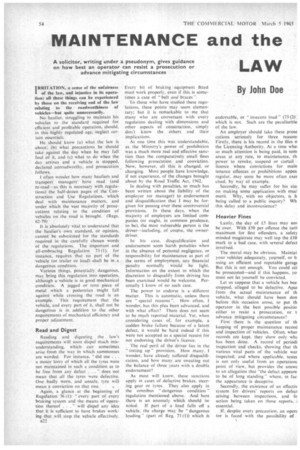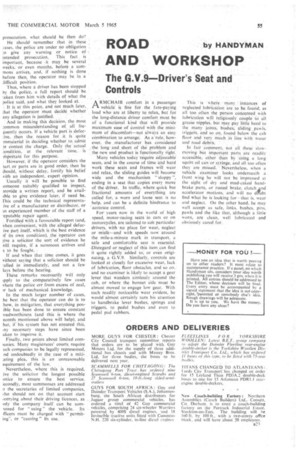MAINTENANCE and the LAW
Page 56

Page 57

If you've noticed an error in this article please click here to report it so we can fix it.
By John Doe
A solicitor, writing under a pseudonym, gives guidance on how best an operator can resist a prosecution or advance mitigating circumstances IRRITATION, a sense of the unfairness of the law, and injustice in its operation: all these things can be experienced by those on the receiving end of the law relating to the roadworthiness of vehicles—hut quite unnecessarily-.
No haulier. struggling to maintain his vehicles to the standard required for efficient and profitable operation, should. in this highly regulated age, neglect certain essentials.
He should know (a) what the law is about; .(b) what precautions he should take against the day when he may fall foul of it, and (c) what to do when the day arrives and a vehicle is stopped, declared unroadworthy, and prosecution follows.
I often wonder how many hauliers and transport managers • have read (and re-read—as this is necessary with.regulations) the half-dozen pages of the Construction and Use Regulations, which deal with maintenance matters, and under which the vast majority.of prosecutions relating to the condition of vehicles on the road is brought. (Regs. 62-79)
It is absolutely vital to understand that the haulier's own standard, or opinion, cannot be substituted for the standards required in the carefully chosen words of the regulations. The important and all-embracing Regulation 73(1), for instance, requires that no part of the vehicle (or trailer or load) shall be in a dangerous condition.
Various things. potentially dangerous, may bring this regulation into operation, although a vehicle is in good mechanical condition. A jagged or torn piece of metal which a pedestrian might fall against while crossing the road is an example. This requirement that the vehicle, and every part of it. shall not be dangerous is in addition to the other requirements of mechanical efficiency and proper adjustment.
Read and Digest
• Reading and digesting the law's requirements will soon dispel much misunderstanding. which can sometimes arise from the way in which summonses are worded. For instance. "did use . . . a motor lorry of which all the tyres were not maintained in such a condition as to be free from any defect .....does not mean that all the tyres were defective. One badly worn, and unsafe. tyre will mean a conviction on that one. • Again, a glance at the beginning of Regulation 76 (1): " every part of every braking system and the means of opera
tion thereof . . " will dispel any idea that it is sufficient to have brakes working that will stop the vehicle effectively. a22
Every bit of braking equipment fitted must work properly, even if this is sometimes a case of "belt and braces ".
To those who have studied these regulations, these points may seem elementary; but it is remarkable to me that many who are conversant with every regulation dealing with dimensions and other aspects of construction. simply don't know the others and their implications.
At one time this was understandable, as the Ministry's power of prohibition was a much more real and effective sanction than the comparatively small fines following proseaution and conviction. Now, however, all this is changed, or changing. Most people have knowledge, if not experience, of the changes brought about by the Road .Traffic Act, 1961 In dealing with penalties, so much has been written about the liability of the employer (or manager) to endorsement and disqualification that I may be forgiven for passing over these controversial provisions. In these days. when the majority of employers are limited cornpanics (or ought, in common prudence, to be), the most vulnerable person is the driver—including, of course, the ownerdriver.
In his case. disqualification and endorsement seem harsh penalties when in the absence of personal negligence, or responsibility for maintenance as part of the terms of employment, any financial penalty normally would be light. Information on the extent to which the discretion to disqualify from driving has been exercised would be welcome. Personally 1 know of no such case.
The power to endorse is a different matter. This is automatic, unless there are "special reasons ". How often. I wonder, has this plea been advanced, and with what effect? There does not seem' to be much reported material. Yet, when considering cases of, for example, a sudden brake failure because of a latent defect, it would be hard indeed if this were not accepted as a special reason for not endorsing the driver's licence.
The real peril of the driver lies in the "totting up" provision. How many. I wonder, have already suffered disqualification, and how many are sweating out the balance of three years with a double endorsement?
As most will know, these sanctions apply in cases of defective brakes. steering gear or tyres. They also apply in the omnibus "dangerous condition" regulation mentioned above. And here there is an anomaly which should be noted. If part of a load falls off a vehicle, the charge may be "dangerous loading " (part of Reg. 73 (l)) which is endorsable, or " insecure load" (73 (2): which is not. Such are the peculiaritie of the law.
An employer should take these prose cutions seriously for three reasons. Firstly, there is his record in the files o the Licensing Authority. At a time whei so much attention is being paid, in son' areas at any rate, to maintenance, th power to revoke, suspend or curtail licence where convictions for main tenance offences or prohibitions appea regular, may soon be more often exei cised, by way of example.
Secondly, he may suffer for his situ on making some application with mudl merit. Why, with no objectors, is h being called to a public inquiry? Wh this delay and inconvenience?
Heavier Fines
Lastly, the •day of £5 fines may no' be over. With £50 per offence the tarii maximum for first offenders, a safety minded magistrate may well top the £10 mark in a bad case, with several defect involved.
The moral may be obvious. Maintai your vehicles adequately, yourself. or 13' using an efficient and reputable garagt But this is not enough. You could stil be prosecuted—and if this happens, yo must not let yourself he convicted.
Let its suppose that a vehicle has bee stopped, alleged to be defective. Apt from the actual maintenance of th vehicle, what should have been don before this occasion arose, to put th operator inthe best possible positio either to resist a prosecution, or t advance mitigating circumstances'?
First there is the question of th keeping of proper maintenance record and inspection of vehicles. Often, wher records are kept, they show only vilu has been done. .A record of periodi inspection and checks, showing that th various vital parts of the vehicle wer inspected, and where applicable, testes is not only useful from an operatiom point of view, but provides the answc to an allegation that "the defect appeare to be of long standing" where, in far the appearance is deceptive.
Secondly, the existence of an effectiv system for drivers' reports on defect arising between inspections, and fa action being taken on those reports, essential.
lf, despite every precaution, an open tor is faced with the possibility of prosecution. what should he then do?
He should remember that in these .-..ases. the police are under no obtigation '.c• give any warning or notice of intended prosecution. This fact is important, because it may. be several weeks, or even months, before a summons arrives, and, if nothing is done before then, the operator may be in a difficult position. Thus, where a driver has been stopped by the poliCe, a full report should • be taken from him with details of what the police said, and what they looked at. it is at this point, and not much. later, that the operator must decide .whether
any allegation is justified.
And in making this decision, the most :ommon misunderstanding of all freluently occurs. If a vehicle part is ,defec7 then the reason for. it is quite mmaterial in deciding whether, to. admit 1r Contest the charge. Only the actual :-"onditidn, at the relevant time, -is
mportant for this purpose. • , However, if the operator considers the iart_or parts are in good order, then he thould, without delay, fortify his belief vith an independent, expert opinion.
Usually it will be possible to find tomeone suitably qualified to inspect, ?rovide a written report, and be availible to give evidence later, if need be. [his could be the technical representaive of a manufacturer or distributor, or in experienced member of the staff of a -eputable repair agent.
. Fortified with a favourable report (and, when convenient, with the alleged defecive Part itself, which is the best evidence if its own condition), the operator can ;ive a solicitor the soli of evidence he vilt require, if a summons arrives and
s to be fought. .
If and when that time comes, it goes vithout saying that a solicitor should be :ailed in immediately, and not a few lays before the hearing. These remarks necessarily will only ipply tothe comparatively few cases vhere the police err from excess of zeal, ir lack of mechanical knowledge.
in the much larger number of cases, he best that the operator can do is to how, in mitigation, that everything posible has been 'done to ensure constant oadworthiness (and this is where the ecords_.mentioned above will help), and hat, if his system has not ensured this, Lily necessary steps have since been aken to improve it.
Finally, two points about limited corntanies. Many magistrates' courts require itch companies to be legally represented, .nd undoubtedly in the case of a mid:wing plea, this is an unreasonable equirement of the law.
Nevertheless, where this is required, ive the solicitor the longest possible lotice to ensure the best service. ecerndly, most summonses are addressed p• the secretaries of limited companies, iho should not on that account start vorrying about their driving licences, as
■ nly the company itself. can be sumioned for " using" the vehicle. its fficers must be, charged with " permiting", or "causing" its use.




























































































































































